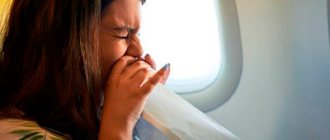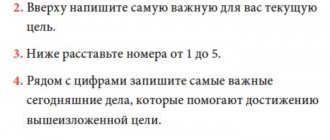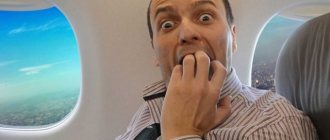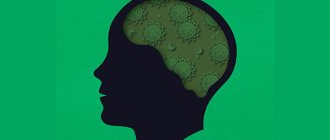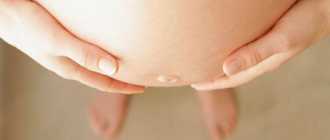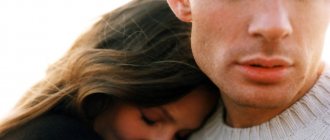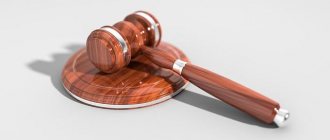How to cope with stress, fear, anxiety Irina Vasilyeva A person, knowing in advance about future emotional stress during a flight, wants to help himself pass the test with dignity. To do this, he is looking for recommendations and pills, but does not know how to navigate the information. Pills that relieve pain are called painkillers. And drugs that can be used to stabilize the emotional state are called anxiolytics or pills for anxiety and fear. There are a great many of them, but which ones are right for you? Let's try to figure out whether there is a notorious “magic pill” that can rid you of aerophobia (fear of flying) once and for all.
Good afternoon, dear reader! Today the topic of our conversation is simple and clear: what pills to choose before a flight to make anxiety and fear disappear? Before talking about the effectiveness of a particular drug, you should talk about the general principle of their action. Or more precisely, about how and with the help of which negative emotions are blocked and the psychological state is leveled. This will make it easier to understand all the pros and cons of these drugs.
The principle of action of anxiolytics
The effect of medications that affect the psychological state is to reduce the excitability of the subcortical areas of the brain responsible for emotions.
These include the limbic system, hypothalamus and thalamus.
Limbic system
It regulates the activity of internal organs, smell, sleep, wakefulness. If you think that you are consciously motivated to engage in any type of activity, I hasten to disappoint you. This vital point is also regulated by the limbic system.
Surprisingly, even the creation of cognitive and research activities is also one of its functions.
As you can see, influencing the functioning of the limbic system is an important step in controlling emotions.
Thalamus
This part of the brain is otherwise called “visual thalamus”. Its main function is the transmission of information from the senses (except smell) to the corresponding areas of the cerebral cortex.
Due to the fact that the motor and sensory information reaching the brain undergoes some changes (due to the action of the drug), the somatic symptoms of the phobia disappear and anxiety decreases.
Eliminating the sensations of motion sickness, nausea, dizziness, and palpitations can in itself make flying on an airplane easier.
Hypothalamus
It is the central link between the nervous and endocrine systems.
The effects of medications help control the release of stress hormones (adrenaline, norepinephrine, cortisol). Correction of hormonal status allows you to influence various aspects of behavior, including those responsible for fear and panic.
In addition, it is responsible for thermoregulation. This helps control hot flashes and excessive sweating.
I hope, thanks to a short excursion into anatomy, you understood that the effect of fear pills is complex and is based on the regulation of the physiological functions of the body.
Eliminating the feeling of fear, these drugs have almost no effect on the body's production of dopamine and serotonin (happiness hormones).
This means that if the phobia was formed as a consequence of a mental disorder, anxiolytics will not be effective.
I won’t overload you with medical information. I’ll tell you better about what kind of body reactions you will get to taking drugs “for fear”. This will give you food for thought.
First flight. How to avoid fear?
The first flight allows you to either find a common language with the sky, or join a group of aerophobes. Most often, this is when fear arises, which is then very difficult to overcome. Sometimes this situation is easy to prevent. For example, if a person does not tolerate transport well, it is better to immediately take pills for motion sickness in order to avoid unpleasant associations with the flight. Also among the top primary reasons is fear of an unusual way of moving. But statistics are on the side of air travel. 1 in 16 million passengers are involved in a plane crash. Moreover, there are survivors in 95% of accidents. For example, with cars, troubles happen much more often - every 5,000th person gets into an unpleasant situation with a car. Even people suffer from lightning strikes and snake bites more often than from airplane emergencies. But most of all, air passengers are afraid of problems with equipment. And this applies not only to beginners. According to research, in 73% of aerophobes, fear is based precisely on the fear of technical problems. However, modern aviation is a highly developed industry. Scientists and designers have done everything to increase the safety of passengers. Airplanes regularly undergo strict technical inspection and, without fail, pre-flight inspection.
The best way to not be intimidated by boarding a plane for the first time is to learn the science behind flying.
A novice aerophobe should know that the work of all important mechanisms is duplicated, and the state of the vessel is completely controlled by the computer. For example, fears are often associated with possible engine failure. Many modern aircraft have 4 engines; they can easily continue flying after one of them fails. As a last resort, the aircraft has two engines, which will still allow it to stay in the air for two hours after problems arise. During this time, it will reach the nearest airport or suitable landing site. By the way, engine failure is very rare. It happens once every 2 million flight hours.
Those who suffer from aerophobia should not choose a seat in the tail - the turbulence is felt more strongly there.
Memo for an aerophobe
Psychotherapeutic techniques
Information about the influence of thoughts on a person’s physiological state is not secret. Scientific experiments have been conducted proving the strong effect of hypnotic techniques, including self-hypnosis, on somatic processes.
The very first thing a psychotherapist will teach you, having discovered obsessive thoughts, fears, and phobias in you, is the ability to relax.
The choice of relaxation techniques is quite large: breathing techniques, working with muscle tension, meditation, chanting mantras and much more. After analyzing your individual characteristics, the psychotherapist will select the most suitable technique for you.
At the initial stage of working with a psychotherapist, it is sometimes even useful to take medications at the same time. In addition to the properties described above, they make consciousness more pliable and receptive, which makes it easier to get rid of unwanted patterns of behavior and replace them with more effective ones.
Manifestations of aerophobia
Signs of fear of flying appear before and during the flight.
A person begins to get nervous a few days before the planned departure date. This state is expressed as follows:
- irritability and aggression or depression, withdrawal;
- searching on the Internet for information about old and “recent” plane crashes increases the “degree” of fear;
- Cancellation of a flight before or after check-in.
In Germany, by the way, they treat this problem with understanding: some airlines, if the person canceling the flight has the appropriate certificate, do not charge a certain amount that is usual when returning a ticket.
Already on board the plane, which has not even taken off yet, the aerophobe begins to choke and his heartbeat quickens. Then the muscles may spasm, the gastrointestinal tract may protest, and sweat will flow. A panic attack is possible when the ship rolls, there is an air pocket, or mechanical noise. Any movement of crew members (flight attendants) around the cabin causes suspicion and altercations with them, hysteria.
There may be other physical and mental manifestations. For example, it is believed that quite frequent inappropriate behavior of passengers (fights, scandals) is provoked by aerophobia. So this disorder poisons the lives of not only those who suffer from it (especially if their work involves frequent flights), but also other people. It also poses a threat to the safety of the aircraft and, as a consequence, to the lives of all persons on it.
Flight stimulator training
In some cases, you may be recommended to use a flight simulator to overcome your phobia of flying. This is a complete simulation of a real aircraft, which reproduces most situations possible during a flight.
At your own discretion, you can “take off” and “land”, adjust the weather or time of day (some are afraid to fly exclusively at night).
It is also possible to verify the reliability of the automatic control of the aircraft.
How not to be afraid to fly
If fear does appear, you need to figure out how serious it is - just a feeling of slight anxiety and discomfort or a serious phobia. If in the first case it is quite possible to cope on your own, then in the second, you will most likely need the help of a specialist.
Ways to stop being afraid of flying on your own
Before the flight, you need to set yourself up for a positive attitude. Look at photos of your destination, put an interesting book in your hand luggage, or download your favorite movie to your gadget. Psychologist's advice:
- Sit comfortably in an airplane seat. A comfortable travel pillow and blanket will help.
- Follow all the flight attendants' safety advice - this will give you confidence and give you the opportunity to do something.
- A pleasant conversation with a neighbor, a good book and your favorite music will help take your mind off trying to mentally control the plane.
- Resist the urge to look for suspicious signs in everything (very shaking, strange crackling, flight attendant smiling tensely).
It is important to relax and get comfortable in the airplane seat.
A good way to balance your psycho-emotional state is to do breathing exercises. The simplest exercise: take a deep breath, hold the air for 5 seconds, exhale and hold your breath for another 4 seconds. Repeat this 8 times or until the anxiety subsides.
Before the flight you cannot:
- read plane crash stories;
- watch photographs of aircraft malfunctions and videos from crash sites;
- discuss the likelihood of tragedy;
- You should absolutely not drink alcohol, it can provoke a panic attack.
Alcohol will not save you from panic, but will provoke it.
Now there is a lot of literature on the subject. For example, Alexey Gervash’s book “An Easy Way to Stop Being Afraid of Flying” is very popular. If facts are more important to you than psychological attitude, read a textbook on aerodynamics.
An express method to stop panic within yourself: squeeze your left wrist tightly with your right hand. The pain will help you come to your senses.
If you feel more comfortable with pills, try using sedatives that contain herbal ingredients. More serious medications are taken only as prescribed by a doctor. The same applies to sleeping pills, but it is better to completely avoid them on the plane.
Reliable travel sites verified by UniTicket:
- You can find and book tours online at Travelata and Onlinetours .
- You can book and compare hotel prices on Booking . And the apartments are on Airbnb .
- You can choose the cheapest air ticket among all airlines on UniTicket and Aviasales .
- Find excursions around the world on Tripster and Sputnik8
- Buy insurance and not worry about your health at Cherehapa .
- Rent a car to see even more interesting places on Rentalcars . Or a bike on BikesBooking .
- Book airport transfer Kiwitaxi .
When is it time to seek professional help?
If aerophobia has pronounced forms, and flying is a necessary part of life (frequent business trips), it is worth undergoing a course of psychotherapy. A competent specialist will stop the mechanisms of fear. But you need to immediately understand that this is a very serious, lengthy and morally demanding undertaking.
You can find out how prone you are to aerophobia by answering the questions:
- Long before the trip, you begin to have a fear of flying;
- You cannot control the panic attacks that come;
- You cannot climb the ramp without taking special medications (antidepressants, sedatives, alcohol);
- During takeoff, turbulence and landing, you squeeze the armrests, your palms sweat, and your panic intensifies;
- In a turbulent zone, you expect an emergency every second;
- Throughout the flight, assess the condition of the aircraft and listen carefully to the sound of the engines;
- Pay special attention to the behavior of flight attendants, trying to catch warning signs.
If you answered yes to at least 4 questions, it is better to seek the help of a specialist. You can't limit yourself to just one conversation. A psychologist will first identify the causes of your aerophobia and then conduct a course of treatment. The most effective treatment is using flight simulators, where acceptance of flight is developed using virtual simulators.
Treatment using flight simulators is the most effective
Tablets for aerophobia
If necessary, your doctor will prescribe medications. However, it is worth remembering that pills only help to muffle the body’s reaction, but do not get rid of the phobia. Medicines relevant for aerophobia are divided into two groups:
- cumulative action: taken several times, usually every hour and a half during the flight;
- fast acting: they have a higher concentration and act for several hours at once.
The action of the drugs is based on a single mechanism: inhibition of nerve impulses, relieving muscle spasms. The doctor will prescribe a specific remedy, taking into account:
- causes of phobia;
- individual characteristics of the patient’s psyche;
- degree of neglect of the problem.
Tablets can help those who rarely travel by plane and getting rid of aerophobia is not necessary.
Medications are not an option for those who fly regularly. They are addictive, and frequent use can have a negative impact on the human psyche.
The pill will only help if you fly occasionally
. In any case, the situation with fear of flying cannot be ignored. If the phobia is not controlled, it will begin to progress rapidly.
